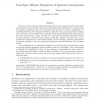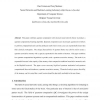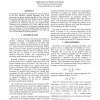5215 search results - page 5 / 1043 » Quantum clustering algorithms |
ECCC
2010
13 years 9 months ago
2010
We give two time- and space-efficient simulations of quantum computations with intermediate measurements, one by classical randomized computations with unbounded error and the oth...
CORR
2010
Springer
13 years 9 months ago
2010
Springer
We present the basic high-level structures used for developing quantum programming languages. The presented structures are commonly used in many existing quantum programming langua...
ISCI
2000
13 years 9 months ago
2000
This paper combines quantum computation with classical neural network theory to produce a quantum computational learning algorithm. Quantum computation uses microscopic quantum lev...
ISMVL
2002
IEEE
14 years 2 months ago
2002
IEEE
We present the role that spectral methods play in the development of the most impressive quantum algorithms, such as the polynomial time number factoring algorithm by Shor. While ...
GECCO
2005
Springer
14 years 3 months ago
2005
Springer
In this paper, we show how genetic programming (GP) can be used to evolve system-size-independent quantum algorithms, and present a human-competitive Quantum Fourier Transform (QF...



